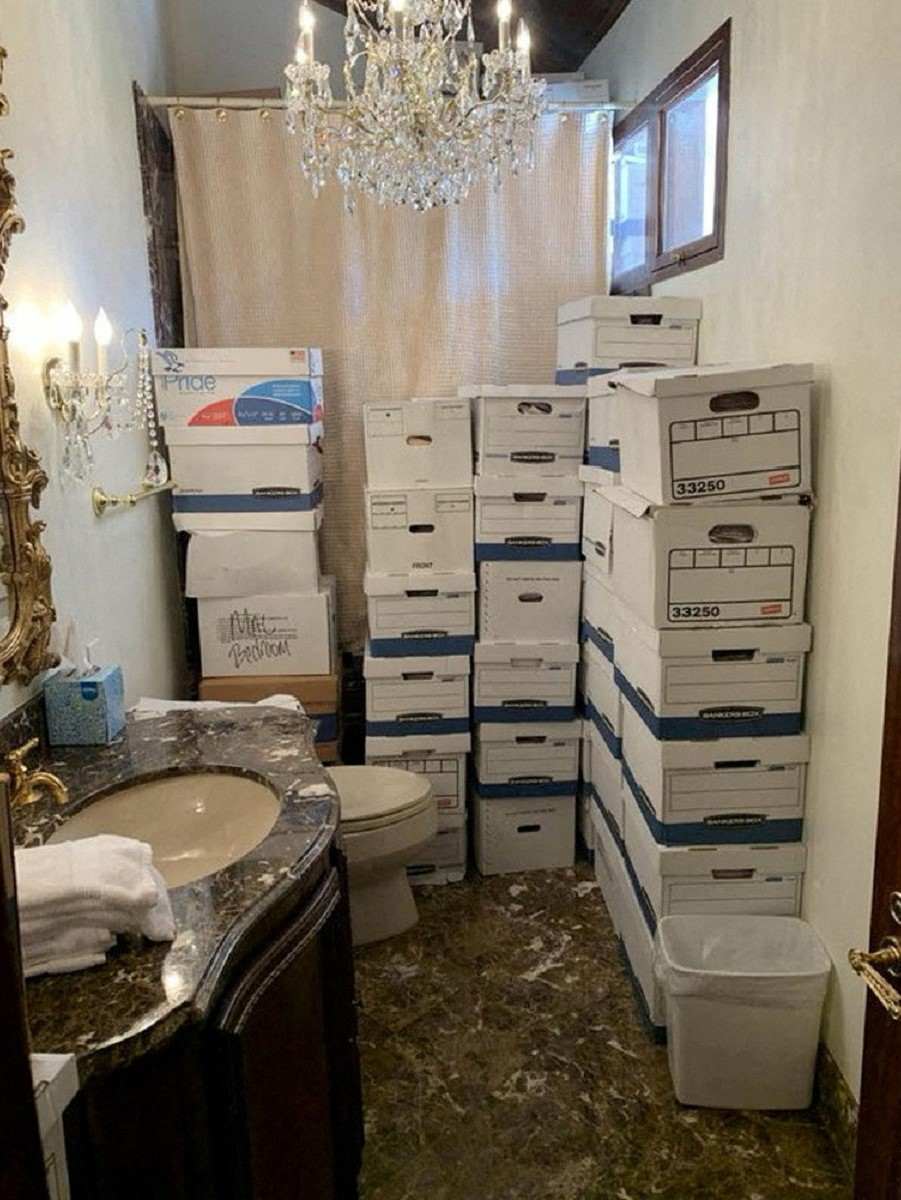
A photo published by the U.S. Justice Department in their charging document against former U.S. President Donald Trump shows boxes of documents stored in a bathroom at Trump’s Mar-a-Lago club in Florida in early 2021 as seen embedded in the document released by the Justice Department in Washington, U.S. June 9, 2023.
14:18 JST, June 12, 2023
When Donald Trump was indicted last week on charges of willful retention of classified documents, many Republicans, including House Speaker Kevin McCarthy, cried foul, arguing that the Justice Department was treating the 45th president differently than it has Democrats who’ve been investigated over possible mishandling of national security secrets.
But the Trump indictment itself helps explain the difference between his case and other high-profile probes, like those of Hillary Clinton, President Biden and former vice president Mike Pence – not for what it charges, but for what it doesn’t.
Trump faces 31 counts of willful retention of national defense information, a crime delineated in the Espionage Act that carries a maximum prison sentence of 10 years. Each count represents a different highly sensitive document that Trump allegedly kept at Mar-a-Lago, his Florida residence and private club.
Twenty-one of those documents, including some involving nuclear secrets, were found by FBI agents who searched the estate in August – yielding a total of 102 classified documents, according to the indictment. The other 10 willful-retention charges stem from a batch of 38 classified documents turned over to the FBI last June in response to a grand jury subpoena.
But the historic investigation into the former president was precipitated months earlier, in January 2022, when the former president gave 15 boxes of papers to the National Archives and Records Administration. The agency had been seeking all presidential records from Trump since he left office.
Inside the boxes, archivists found 197 classified documents, some extremely sensitive, the government alleged in court filings. That discovery set in motion the chain of events that led to the unsealing Friday of a 38-count indictment against Trump and Walt Nauta, a trusted servant.
Notably, however, the indictment does not charge Trump with the illegal retention of any of the 197 documents he returned to the archives.
That shows that if Trump had simply returned all the classified documents he had, he probably never would have been charged with any crimes, said Robert Mintz, a former federal prosecutor.
“This is not a case about what documents were taken, it’s about what former president Trump did after the government sought to retrieve those documents,” said Mintz, who noted that willful-retention cases often hinge on how much evidence prosecutors can find that a person deliberately hid material or refused to give it back.
The indictment offers anecdote after alleged anecdote charging that the former president sought to hide and keep some of the classified papers, so much so that Trump and Nauta are accused of conspiring to obstruct the investigation and scheming to conceal the truth not just from the government, but even from Trump’s own lawyer.
Those allegations include: moving boxes out of a storage room; telling an attorney to search that room for classified material without saying that dozens of boxes were being kept elsewhere; suggesting an attorney hide or destroy documents that had been subpoenaed; and causing another person to make false statements about whether all the classified documents had been produced.
“That’s not the kind of evidence you typically find in a case like this, and it’s certainly not the type of evidence so far that has come out of the Biden investigation or the Clinton email server case,” Mintz said.
According to the indictment, Trump ruminated about the Clinton case in May 2022, as he discussed how to respond to the subpoena he had just received.
As a presidential candidate running against Clinton in 2016, he had railed against her use of a personal email server to conduct government business while serving as secretary of state – an arrangement that led to classified information being shared on a nonclassified, nongovernment computer server. Clinton’s case was also different from Trump’s in another key respect: While the email chains discussed classified topics, they were not classified documents in the traditional sense, with extensive markings and acronyms.
But when discussing his own possible mishandling case last year, Trump seized on another facet of the Clinton probe: that attorneys for Clinton had reviewed more than 60,000 emails and turned over about 30,000 to government officials because they were deemed related to her official duties. Clinton’s lawyers deleted the rest, about 30,000 emails, after deeming them personal and unrelated to her work. It has long been standard practice in the federal government for officials to review their own correspondence in response to Freedom of Information Act requests and decide which of their emails are personal and therefore not turned over. In Clinton’s case, her lawyers did that for her.
As a candidate and president, Trump denounced the decision to delete the emails. In July 2016, he notoriously declared at a news conference: “Russia: if you’re listening, I hope you’re able to find the 30,000 emails that are missing. I think you will probably be rewarded mightily by our press.”
When the grand jury subpoena for any classified documents arrived at his door, however, Trump expressed a very different view to his lawyer, according to the indictment, praising Clinton’s lawyer for deleting the 30,000 emails.
The Clinton lawyer, Trump allegedly said on May 23, 2022, “was the one who deleted all of her emails, the 30,000 emails, because they basically dealt with her scheduling and her going to the gym and her having beauty appointments. And he was great. And he, so she didn’t get in any trouble because he said that he was the one who deleted them.”
“Trump related the story more than once that day,” the indictment notes dryly.
“I really don’t think there’s any plausible comparison between the Trump case and the Hillary Clinton case,” said Robert Kelner, a veteran D.C. attorney. “The key difference is that in the Hillary Clinton case, as we learned from the Department of Justice inspector general report, there was no evidence that Hillary Clinton sought to obstruct justice. … The focus of the Trump indictment is on his rather stark effort to obstruct justice. That’s the fundamental difference.”
Kelner is critical of how the FBI handled aspects of the Clinton case, arguing that at times, the agency pulled punches when it came to investigating the conduct of some of those around her. But he said those criticisms do not change the fact that Trump appears to have repeatedly tried to keep documents he could not legally have, while Clinton did not.
“They have essentially game, set and match against Trump based on the evidence in the indictment,” he said.
Kelner cautioned, however, that he expects Trump’s lawyers will fight hard, potentially trying to convince at least one juror that a former president should not go to prison over the documents case. He said there was “a very real chance Trump’s team could obtain a mistrial, no matter how compelling the evidence.”
Comparing the Trump indictment to the ongoing investigation of Biden is more difficult, partly because fewer facts are known about the current president’s possession of classified documents when he was out of office.
The Justice Department began investigating the matter late last year, when roughly a dozen classified documents were found at a think tank office in Washington that Biden had used before he became president – suggesting the papers may have dated to his time as vice president.
Weeks after that discovery, a small number of classified documents were also found at Biden’s Wilmington, Del., home. Attorney General Merrick Garland has appointed a special counsel, Robert Hur, to investigate whether any crimes were committed. Biden’s lawyers say they have cooperated at every step of the investigation and readily returned all classified materials found in the office and the Wilmington house. An FBI search of Biden’s beach house turned up no classified papers.
The Pence case also points to the key distinction in the national security probes involving presidents, former top officials or presidential candidates – that it is not so much what is taken, but what is kept. Just a week before the Trump indictment, the Justice Department notified Pence it had closed an investigation into whether he mishandled classified information.
FBI agents had conducted a consensual search at Pence’s Indiana home in February, after a lawyer for Pence found “a small number” of potentially sensitive or classified documents there in late January. The FBI search turned up one additional classified document, according to an adviser.
All the materials were quickly turned over to government authorities, Pence’s lawyer said.
Days after the Justice Department closed the case, Pence formally announced his 2024 bid for president.
He joined a crowded Republican field, in which Trump is the front-runner.
Top Articles in News Services
-

Survey Shows False Election Info Perceived as True
-

Hong Kong Ex-Publisher Jimmy Lai’s Sentence Raises International Outcry as China Defends It
-

Japan’s Nikkei Stock Average Touches 58,000 as Yen, Jgbs Rally on Election Fallout (UPDATE 1)
-

Japan’s Nikkei Stock Average Falls as US-Iran Tensions Unsettle Investors (UPDATE 1)
-

Trump Names Former Federal Reserve Governor Warsh as the Next Fed Chair, Replacing Powell
JN ACCESS RANKING
-

Producer Behind Pop Group XG Arrested for Cocaine Possession
-

Japan PM Takaichi’s Cabinet Resigns en Masse
-

Man Infected with Measles Reportedly Dined at Restaurant in Tokyo Station
-

Israeli Ambassador to Japan Speaks about Japan’s Role in the Reconstruction of Gaza
-

Videos Plagiarized, Reposted with False Subtitles Claiming ‘Ryukyu Belongs to China’; Anti-China False Information Also Posted in Japan


























